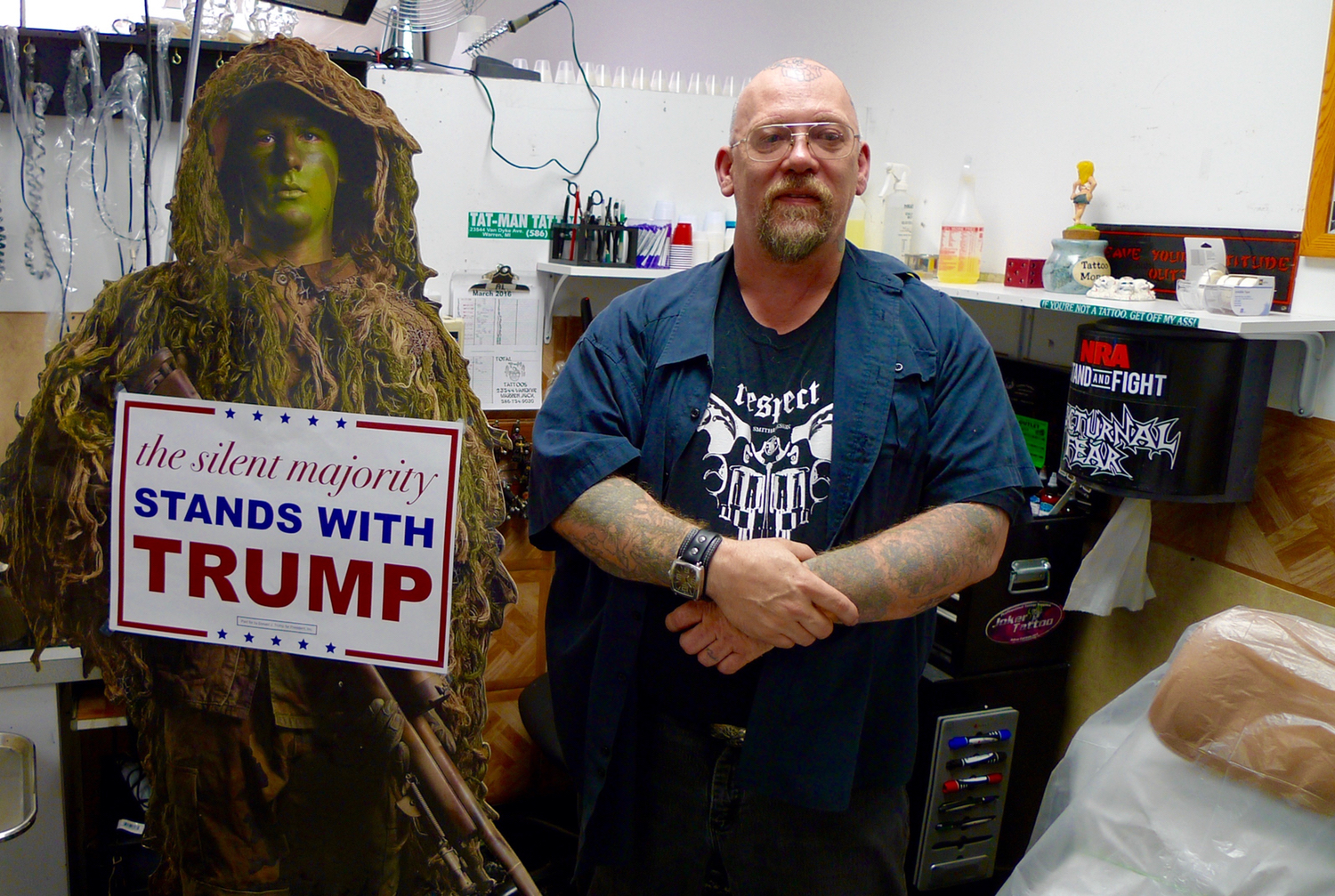Candidates are gone, but economic woes remain for Trump, Sanders supporters

In March, Alvin Carden attended a Warren rally for presidential candidate Donald Trump, wearing his red, white and blue cowboy hat and waving a sign proclaiming “the silent majority stands with TRUMP.” The sign is now displayed on a cardboard cutout of an American military sniper that Carden keeps in his business, Tat-Man Tattoos in Warren. And Carden’s red, white and blue enthusiasm for the outsider candidate hasn’t dimmed a bit.
Fifty-some miles away, in Port Huron, Carden’s daughter, Amanda Myers, is backing a different candidate for president. Just home from her job as a bakery clerk at a Meijer store, she sits in her apartment’s living room and explains why she’s feeling the Bern for Bernie Sanders.
But father and daughter have more in common than you might think.
They both live close to the economic margin. Tat-Man Tattoos doesn’t make much money, and Carden, 51, already gave his share to his brother, Dale, who runs it with him; he plans on moving north as soon as he can sell his house. Carden has always scratched out a living from a mix of tattooing and various blue-collar jobs. Dropping out of high school short of graduation deprived him of an essential job credential, but military service helped.
Myers, 31, finished high school and has post-secondary training in medical assisting, photography, cake decorating and school-bus driving, but $8.75 an hour is what she’s making now. She’d like to open a photo studio to serve poor people, so they can have nice pictures of their children, like her mother could never afford when she was growing up in Warren. Carden and Amanda’s mother divorced when she was 5, she didn’t see him much until she was a teenager, and in between there was a lot of government cheese and shoes that didn’t fit, she said.
And they both have a deep distrust of the establishment candidates in their respective party races. Myers finds Hillary Clinton “dishonest and dodgy.” Carden thinks he’s just “done with politicians,” period.
“(Republicans) run the House and Senate, and still can’t get anything done,” he said.
This father and daughter, like many voters in Michigan, have considered all these things and come to the same conclusion from 180-degree different directions: It’s time for a big, big change.
And not just in the White House.
Michigan’s presidential primary was an election, but it was also a symptom of a growing anger and disaffection among Michigan residents who feel the economic recovery has passed them by.
Who understands me?
Trump received the highest proportion of Republican primary votes in counties with lowest average wages or where wages have fallen the most since the recession. Sanders’ path to victory followed a similar downtrodden road. For example, in Ionia County, where average wages plummeted 20 percent between 2007 and 2015, the worst in the state, Sanders received 64 percent of the Democratic vote - his fifth-highest win percentage.
Among Trump’s most lopsided victories were Macomb and St. Clair Counties, where Carden and Myers live.
This doesn’t surprise Carden, who said he has watched Warren “fall to pieces” in recent years, with job loss, drugs and crime. He caught a drug addict rifling through his brother’s car. He wonders why driving in Ohio is like “driving on glass” compared to Michigan’s potholed highways. There are a lot of things worse today than when he was young, and he blames politicians for not solving them, or even addressing them.
Myers, 20 years younger, is more hopeful, which is one reason she backs Sanders. In the Vermont senator she sees a man who sees her, and all the things that make it hard to get ahead, even when one is willing to work hard – health care, child care and especially the minimum wage.
“I like his plan to use our taxes for what they’re intended to be used for -- to help people,” she said. “We need to bring the middle and upper class closer together. Minimum wage is a huge issue for me, and I argue with my dad about it all the time.”
Myers’ concern about income inequality puts her in plenty of company. According to Michigan exit polls, 60 percent of Sanders voters ranked it their No. 1 issue of concern, followed by health care, the economy/jobs and terrorism.
Her father thinks raising the minimum wage, and taxing the wealthy at higher rates, will only drive jobs and the rich out of the country. But he’s more alarmed by who’s coming in, and rates immigration, legal and otherwise, as his biggest area of agreement with Trump.
“We can’t survive with open borders,” Carden said, expressing concern that the worldwide movement of refugees, particularly from the Middle East, imperils the U.S. But he, too, believes “getting people back to work” is nearly as important. He likes Trump’s idea of tariffs and other economic punishments for American companies that ship jobs out of the country.
Disgust, distrust and other motivations
Both candidates have support from those in different places on the economic ladder, too.
Matt Burtraw is 50 years old, works in sales and lives in a different, more affluent part of Macomb County – Macomb Township, north of M-59, where newer subdivisions prevail and higher-end shopping is as close as the Mall at Partridge Creek, on its southern boundary. But he’s all-in for Trump, too, for many of the same reasons Carden is.
Burtraw describes himself as a faithful Catholic, and sends his two children to parochial schools, something that’s “very important” to him. But the social issues pitched to people like him – religious freedom, abortion – don’t play much of a part in determining his vote. Nor does much of the high-volume, unflattering publicity surrounding his chosen candidate, either.
“I couldn’t care less about that reality-show stuff,” he said. He’s more worried about the “house of sand” the national economy seems to be, and the “chasm” between well-paying, higher-skill jobs and low-end, service-industry positions.
“The middle-ground jobs don’t seem to be there,” Burtraw said, adding that skilled trades and some manufacturing work is going begging for applicants, but too many lack the proper training.
“We stopped doing vocational training in high schools,” he said. “But those jobs could be filled, if we really wanted to.”
Kevin Mack is a Detroit electrician, union member, 28 years old and African American. And he’s backing Sanders because, like Myers, he believes that the outsider candidate is the only one who understands what it’s like to be working class and striving.
As a blue-collar voter, Sanders’ own jobs proposals -- to invest in national infrastructure, creating millions of jobs in construction, road building and related fields -- resonates with Mack, too.
“Every summer, we’re just patching, patching, patching,” he said. “It’s time for rebuilding.”
Who’s missing the message?
Sanders’ Michigan upset of Clinton, and Trump’s success nationwide, “shows the yawning gap between elected leaders and voters,” observed Craig Mauger, executive director of the Michigan Campaign Finance Network, which tracks spending in state elections.
Mauger recently compiled total spending in primary races so far, and found that super PACs, the big-spending entities that have become big players in presidential politics, have ignored both Trump and Sanders. Donors in Michigan have sent $5.2 million to super PACs supporting Clinton, and Republican candidates Jeb Bush, Chris Christie, Marco Rubio, Scott Walker and Carly Fiorina, all out of the race. (Kasich’s super PAC, New Day for America, received $226,000, the least of all in Michigan, but he is still running.)
Trump’s personal wealth, which allows him to self-finance his campaign, and his penchant for grabbing the spotlight, which earns him media attention, is one of the things Carden most admires about the candidate.
“The world is a business nowadays, and the world needs someone who knows how to run a business,” said Carden. To that assertion, Myers rolls her eyes.
“When I see Trump spouting hateful speech about women, it completely puts me off,” she said. “So who’s going to do business with him?”
For now, they disagree with one another. But they both feel strongly that the game is rigged and they are among its losers. They also know their votes count as much as anyone else’s, they used them to satisfying results in Michigan’s primary, and they may do so again in the fall.
See what new members are saying about why they donated to Bridge Michigan:
- “In order for this information to be accurate and unbiased it must be underwritten by its readers, not by special interests.” - Larry S.
- “Not many other media sources report on the topics Bridge does.” - Susan B.
- “Your journalism is outstanding and rare these days.” - Mark S.
If you want to ensure the future of nonpartisan, nonprofit Michigan journalism, please become a member today. You, too, will be asked why you donated and maybe we'll feature your quote next time!


 The soldier is cardboard, but Alvin Carden thinks it looks like his nephew, and as a military veteran himself, he likes the message it sends with his Trump rally sign, so he keeps it in his tattoo shop in Warren. (Bridge photo by Nancy Derringer)
The soldier is cardboard, but Alvin Carden thinks it looks like his nephew, and as a military veteran himself, he likes the message it sends with his Trump rally sign, so he keeps it in his tattoo shop in Warren. (Bridge photo by Nancy Derringer) Amanda Myers has a lot in common with her father, but not her politics. She voted for Bernie Sanders, and finds Hillary Clinton dishonest and out of touch with her concerns. (Bridge photo by Nancy Derringer)
Amanda Myers has a lot in common with her father, but not her politics. She voted for Bernie Sanders, and finds Hillary Clinton dishonest and out of touch with her concerns. (Bridge photo by Nancy Derringer)